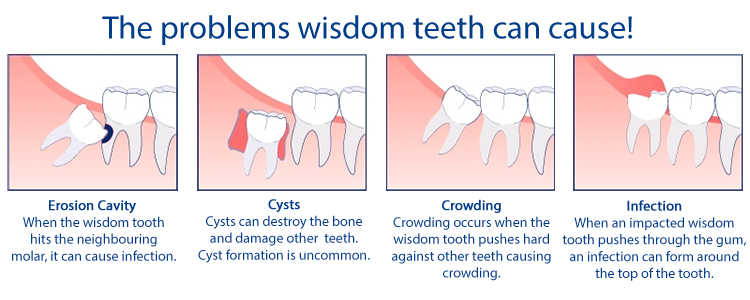Wisdom Teeth
What are wisdom teeth?
Wisdom teeth are also known as ‘third molars’. These teeth are the last to erupt. They often appear between the ages of 17-21, though this varies with different people. By the time they erupt, the jaws have little space left for the wisdom teeth to grow.
Why do we extract wisdom teeth?
For the majority who develop the teeth, they may present some difficulties. They are extracted because:
- they may erupt in abnormal positions
- they may get trapped below the gum line when they lack space to grow
- they might lead to infection from trapped food, plaque or bacteria
- they might change the patient’s bite, causing malocclusion or misalignment of the teeth
- the teeth might begin to decay as they are hard to reach

How are they removed?
Before extraction of the tooth, the dentist will administer an anesthetic. This anesthetic will help numb the tooth and surrounding tissues to prevent any pain. Once the anesthesia kicks in, the dentist will remove the gum tissue covering the tooth. In cases where there is some bone covering the tooth, it will also be taken out.
After he or she locates the tooth, they use surgical instruments to loosen the tooth from its socket. Sometimes, the tooth might be at risk of breaking during extraction. To prevent this, the dentist might cut it to small sections before removing the tooth. After the tooth is loose or sectioned, the dentist will extract it. In some cases, the dentist will need to add stitches for proper healing of the area. This may especially be necessary when the teeth were deep within the gum line.
Recovering from the tooth extraction
The recovery period should last a few days. Your dentist might prescribe some painkillers to help deal with any post-surgery pains.
Following the surgery, the area where the tooth had been will be bleeding. The bleeding can be controlled by placing a clean, moist gauze or cotton wool. This should stop the bleeding within 45 minutes to an hour. It is important to relax after the surgery. Physical activity might increase the bleeding.
Avoid rubbing the area with your tongue or fingers. This might trigger the affected area to start bleeding again and/or cause an infection.
It is advisable to eat soft foods following the surgery. You could gradually add more solid foods to your diet as you continue to heal.
Do not smoke for at least 24 hours after your surgery. Smoking may contaminate the healing area or loosen the clot.

